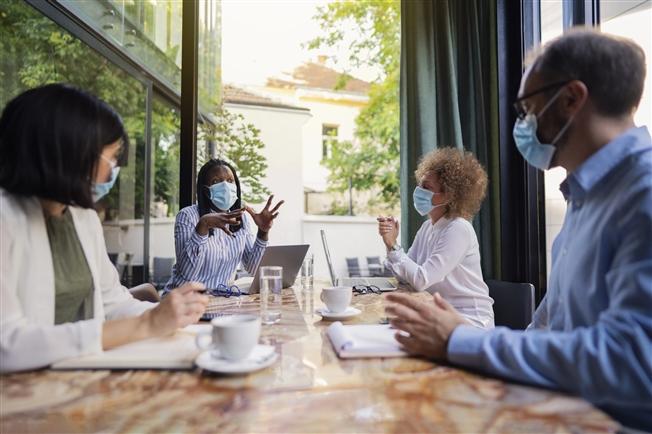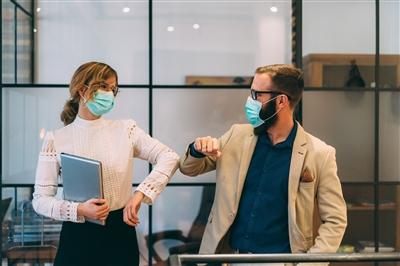6 tips to better communicate while wearing a mask

Wearing a mask has quickly become a routine part of daily life—and will continue to be for the foreseeable future. Masking is an important and effective way to slow the spread of COVID-19, but a mask can also make it challenging to communicate clearly.
Masks can cause speech to become muffled or distorted, making it difficult to understand what is being said. “Those with hearing loss or neurologic impairment, such as stroke or brain injury, may have a harder time understanding someone who is speaking from behind a mask,” says Karen Collins, MS, CCC/SLP, CBIS, a speech- language pathologist at Bryn Mawr Rehab Hospital, part of Main Line Health.
Communication happens both verbally and nonverbally. While you are listening to someone speak, your brain is also picking up on their facial expressions and body language to help you understand what is being said. “Wearing a mask eliminates facial expressions from this equation, which can make it more challenging to interpret the meaning behind what someone is saying,” says Bryn Mawr Rehab’s Jolynn Thomas, MS, CCC/SLP, CBIS. “It is especially difficult for those with hearing loss, who are unable to read lips or facial cues.”
Tips to better communicate while masked
Of course, not communicating with others isn’t an option. Bryn Mawr Rehab's speech therapy team has a few suggestions for communicating clearly and comfortably when you’re wearing your mask:
- Use gestures, hand signals or nonverbal cues to help demonstrate your point. Waving to greet someone, smiling with your eyes as you speak or giving a thumbs up are examples of nonverbal communication.
- Write information down. Whether you’re trying to communicate with your health care provider during an appointment, are giving directions or simply communicating in a noisy space, writing information down can help to eliminate confusion.
- Talk slowly, enunciate and repeat yourself to make sure the other person clearly understands. We have a tendency to rush speech, especially when we’re busy. Taking extra time to speak slowly and deliberately can help overcome communication challenges.
- Use descriptive language. Masks make it difficult to read emotions on a person’s face. We need to speak our emotions rather than relying on facial expressions.
- Avoid loud, busy environments. Background noise can further muffle speech. If possible, find a quiet area to have a discussion.
- Ask questions if you don’t understand what is being said to you. If you are communicating, confirm that the other person understands what you are saying before you end a conversation.

One thing not to do? Forego your mask completely. We all know that face coverings can be uncomfortable or make daily life a little trickier, but not wearing one can put you and others at risk for COVID-19.
Educating patients and families
Bryn Mawr Rehab speech therapists are helping patients and families communicate more effectively. “We are asked about communication with masks at nearly every visit,” says Thomas. “We’re educating patients and their families on the tips above and encouraging them to speak up about their feelings. Having difficulty communicating can be very frustrating; it’s important to voice those feelings.”
It’s also important to be sensitive to cultural differences while communicating. “While hand gestures can help demonstrate a point, it’s important to be sensitive to which gestures you use as some may have a different meaning in other cultures,” adds Thomas.
Now offering speech therapy virtual appointments
In addition to caring for patients at Bryn Mawr Rehab Hospital inpatient units and outpatient centers, we are now offering virtual speech therapy appointments. To talk with our scheduling team about these options, call 484-596-5000.
Main Line Health serves patients at hospitals and health centers throughout the western suburbs of Philadelphia. To schedule an appointment with a specialist at Main Line Health, call 1.866.CALL.MLH (225.5654).
 Content you want, delivered to your inbox
Content you want, delivered to your inbox
Want to get the latest health and wellness articles delivered right to your inbox?
Subscribe to the Well Ahead Newsletter.
